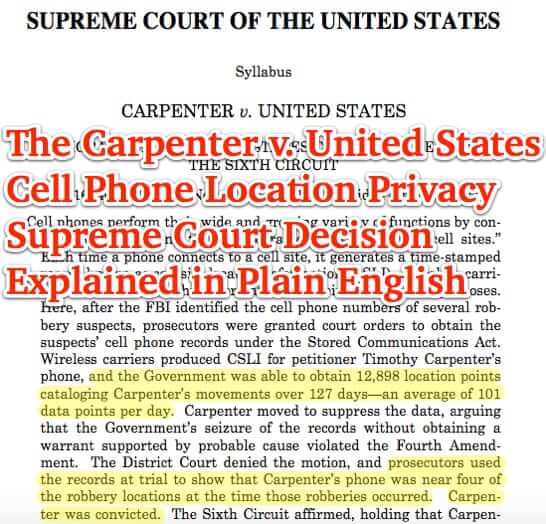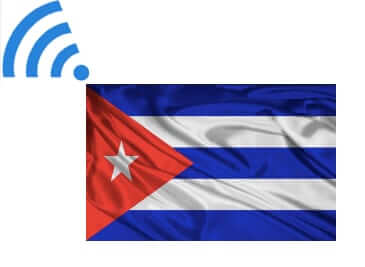Tag: united states
Data Broker was Selling Location-Tracking Data of People Visiting Abortion Providers
So a date broker was selling the location-tracking data of people visiting abortion providers. Data about all sorts of things holds value, and in today’s world, your data holds plenty. Like it or not, your data has almost definitely already been bought and sold. Just like mine, just like nearly every other person’s in the good ol’ US of A. Of course, it would be nice if you or I had some say in the matter. Personally, I would not freely consent to my data being bought or sold without providing me a benefit, and that is precisely the reason why I don’t have any say in the matter.
The Carpenter v. United States Cell Phone Location Privacy Supreme Court Decision Explained in Plain English (plus link to full text of decision)
In a fairly stunning win for mobile phone privacy, the Supreme Court has ruled that law enforcement agencies must obtain a warrant before they can demand and receive from mobile carriers and mobile providers access to the cell phone location data (known as ‘cell site location information’, or CSLI for short) of a given cellular phone. In the case of Carpenter v. United States, the Supreme Court held that tracking a cell phone is barely different than putting an ankle bracelet on an individual and monitoring their movements, and so overturned related case law that has been around for (up to) decades.
State Department Forced to Remove Blog Post about Trump’s Mar-a-Lago (We Have it Here Though!)
Earlier this week the U.S. State Department wrote a love letter to President Trump’s Mar a Lago (pronounced “maralago” – yes, that does mean “sea by the lake” – hey, we didn’t name it) and posted it to their blog. They quickly got into hot water for shilling for Trump’s business – but not before several other government sites had picked up and published the article. That blog post has now been removed from all public sites – but we have it here for you in case you were curious as to what the brouhaha is about.
Why the U.S. is Concerned about Russian Submarine Activity near Undersea Internet Cables
The United States is worrying about something that they consider a new Russian threat: increased Russan submarine activity around the undersea fiber optic cables that carry Internet communications, and the potential that those submarine cables could be severed, crippling U.S. Internet operations. Whether you see this as promoting Russia as a bogeyman, or a real possibility, the reality is that history has demonstrated that undersea Internet cables can be cut, and that it wreaks havoc.
What You Need to Know about Chip and PIN or Signature Cards
As you may know, last Thursday, October 1st, was the deadline for merchants to be able to accept so-called “chip and PIN” or “chip and signature” smartcard credit cards and debit cards, with the EMV chip. Of course, while the burden is on the merchants to accept them, lots of consumers don’t actually have them, as their banks have not yet issued them a new chipped debit or credit card. Whether you already have your shiny, new chip and PIN or chip and signature card or not, here’s everything that you need to know about them.
What the new U.S. – Cuban Relationship Means for Cuba and the Internet
With the Obama administration’s plan to ease trade restrictions between the United States and Cuba, Cubanos may finally have easier access to an unrestricted Internet. At present, only 5% of Cubans have unfiltered access to the Internet, but if technology and electronics start flowing into Cuba as predicted, the Internet floodgates will open, opening up whole new avenues of communication and trade.
The Supreme Court Cell Phone Search Decision in Riley in Plain English
Today the Supreme Court unanimously held that a warrant is required to search a cell phone, in the case of Riley v. California. Warrentless searches of a cell phone are not ok.
Microsoft Discloses Everything it Can in Wake of NSA & PRISM Leak, Asks Goverment Permission to Disclose Even More
Microsoft has disclosed that it has sought permission from the U.S. government to disclose to the public how it handles requests from the Federal government for user data. Microsoft says “We believe the U.S. Constitution guarantees our freedom to share more information with the public, yet the Government is stopping us.”
Russia Uses Snowden Situation to Push for U.N. to Take Over Control of the Internet
Russia is using the situation with Edward Snowden, the NSA and PRISM leaker, to push an agenda that would see the United Nations taking over primary control of the Internet, from the United States.
U.S. Posts Anti-al-Qaeda Propaganda on al-Qaeda Anti-U.S. Propaganda Sites
In a move that seems to be straight out of Mad Magazine’s beloved Spy vs. Spy, the United States this week says that it has been posting anti-al-Qaeda propaganda on websites used by al-Qaeda to disseminate anti-U.S. propaganda, particularly in Yemen, where al-Qaeda in the Arabian Peninsula (AQAP) has been particularly active as of late. Specifically, the U.S. altered al-Qaeda recruitment ads.
UK and US Look at Option for Sending Emergency Text Messages to 999 and 911 Emergency Services
The U.S. and U.K. both seem poised on the brink of allowing people to send text messages to emergency services, instead of dialing 911 (999 in the UK).
British Teen Banned Forever from United States Over Content of His Email to President Obama
Always remember, and never forget, that the protections of the United States constitution extend only to U.S. citizens, and not to those hoping to visit the US. That is something that British teenager Luke Angel found out the hard way, when an email he sent to U.S. President Barack Obama landed him on the “banned forever from and never allowed entry to the United States” list. No freedom of speech for Luke!










